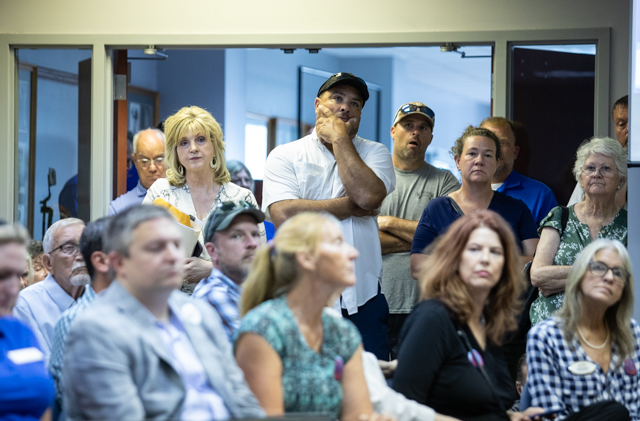Sentencing delayed in police impersonation case, defendant granted bail
Published 6:00 am Thursday, March 27, 2025

- Robert Sharp
A judge on Tuesday postponed the sentencing of a man convicted of impersonating a peace officer in Bowling Green after receiving a request for a new trial.
Warren Circuit Judge J.B. Hines continued the sentencing of Robert Sharp to May 27 after Sharp’s attorney filed a motion for a new trial and a separate motion for a judgment of acquittal notwithstanding the jury’s guilty verdict.
A 12-person jury convicted Sharp, 37, of Nashville, earlier this month of the felony charge of impersonating a peace officer and recommended a one-year prison sentence.
Trending
Sharp, who was taken into custody on March 14 after the guilty verdict, was released on an unsecured bond Tuesday from Warren County Regional Jail.
“The commonwealth certainly believes that after the finding by the jury and the evidence it heard over three days (at trial) that this is worth more than 10 days in jail,” Warren County Commonwealth’s Attorney Kori Beck Bumgarner said after Tuesday’s hearing. “Unfortunately, at this point the judge disagrees and hopefully that changes on may 27.”
The charge stemmed from allegations that Sharp illegally held himself out as a police officer to two 11-year-old girls on Sept. 28, 2022.
Jurors heard evidence that Sharp was traveling on Cardinal Way and stopped his car when he saw the girls walking home after school and offered them candy.
One of the girls testified that she began to approach the car but was pulled back by the other, to which Sharp responded that it was OK, displayed a badge and said he was a cop.
The girls told jurors that they continued walking to their homes after this incident and Sharp drove off in the opposite direction.
Trending
Sharp testified that he told the girls he was a former police officer and the badge he displayed was from his job in Nashville with a private security firm.
Sharp said he had commuted back that afternoon to Bowling Green, where he then lived, from his private security job working a traffic detail in Nashville, and was driving through the community to talk to people about his write-in campaign for 1st District Constable.
Attorney Ken Meredith’s motions, filed Friday on behalf of Sharp, argued that the evidence presented to the jury was not sufficient to sustain a conviction for impersonating a peace officer and that the prosecution failed to prove each element of the offense necessary to obtain a conviction.
“The jury had nothing to base their assumption of guilt on,” Meredith said Tuesday while arguing his motions before Hines, adding that the act of offering candy to the girls was not in itself a crime.
Meredith said that the girls testified that the car they saw Sharp drive had no markings to indicate that it was a police car and they took no pictures of the car at any point during or after their interaction.
Jurors were presented with an image from Sharp’s Facebook page featuring several police cruisers, but Sharp testified that the vehicle he drove was not pictured there or in any other exhibits presented by the prosecution, Meredith said.
The girls’ testimony about what Sharp wore when he spoke with them was too vague to establish that Sharp was impersonating an officer, Meredith argued, saying in his filing that the best description the girls offered of the outfit was that it was black.
Sharp testified that he wore a black T-shirt and black tactical pants, and that a yellow safety vest he wore for his job was in the passenger seat beside him.
Meredith also argued that the prosecution did not establish that Sharp made any effort to induce the girls to submit to his pretended authority as an officer, an element of the criminal charge required to prove his guilt.
Bumgarner argued Tuesday that the testimony from the girls at trial clearly established that they believed Sharp was a police officer at the time, recalling that one of the girls described Sharp’s car on the witness stand as a “cop car” and that the other girl believed in the moment that the interaction was a test by an officer about what to do when approached by a stranger.
Bumgarner also argued that the testimony from the girls was sufficient for a jury to believe that Sharp set out to get them to submit to his pretended authority.
“They changed their behavior after that day, they did not walk home (after school) again,” Bumgarner said.
Regarding the motion for a new trial, Meredith contended that Hines should not have allowed Bumgarner to introduce police body camera footage showing BGPD Officer Steven Irvin interacting with Sharp outside Sharp’s home on the night of Sept. 28, 2022, some six hours after the interaction with the two girls.
Hines had overruled prior motions from Bumgarner to allow the footage to be played, but allowed it into evidence after Sharp began testifying.
Meredith argued that the footage was not relevant because Irvin had not previously interviewed the two girls and only served to prejudice the jury against Sharp, plus the defense did not have enough time ahead of trial to review the footage.
Bumgarner contended in court that the defense had ample time to review the footage and that, while it had been previously suppressed, it became relevant after Sharp’s testimony contradicted what was known to be on the footage.
“(Meredith) specifically elicited testimony that was directly contrary to what he knew was out there,” Bumgarner said.
Hines set an April 1 deadline for Bumgarner to file a written response to Meredith’s motions, and gave Meredith an April 8 deadline to file any replies to Bumgarner’s filings.






